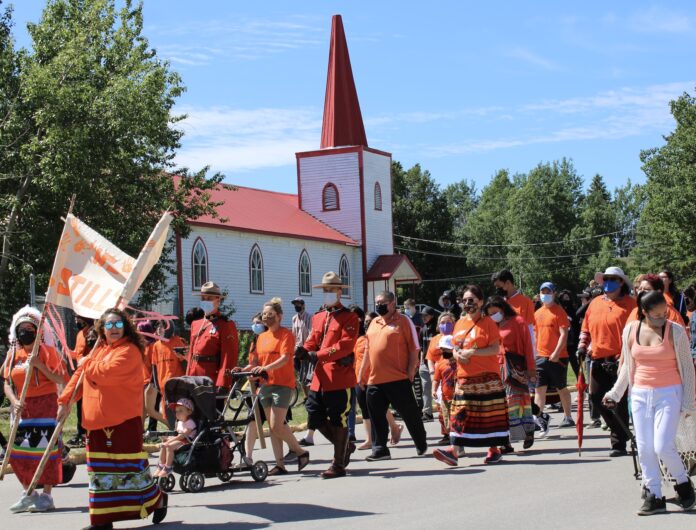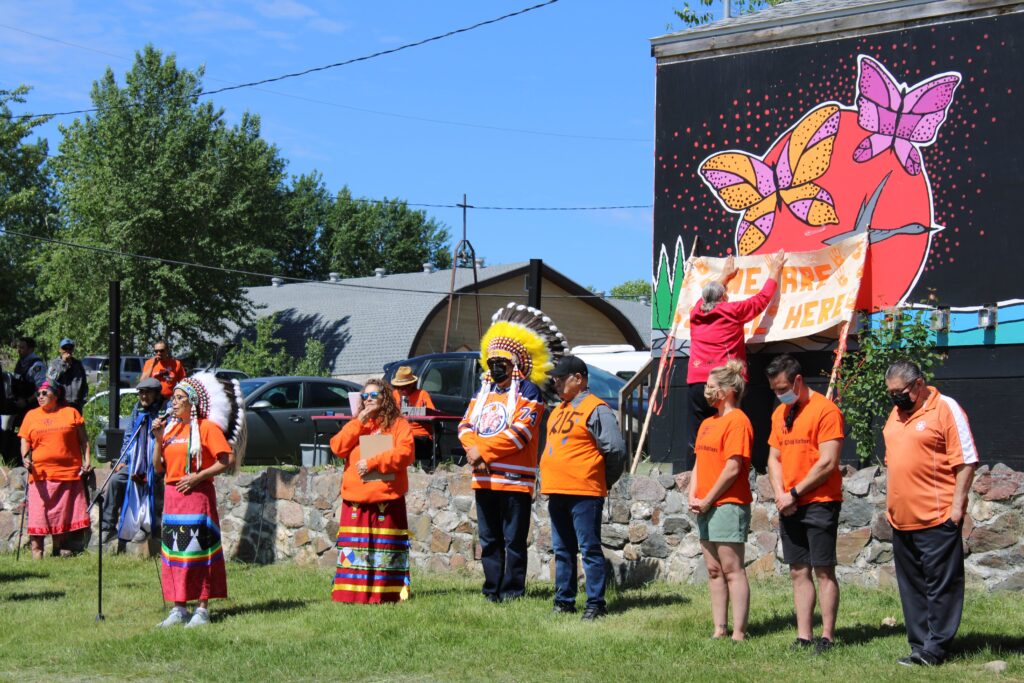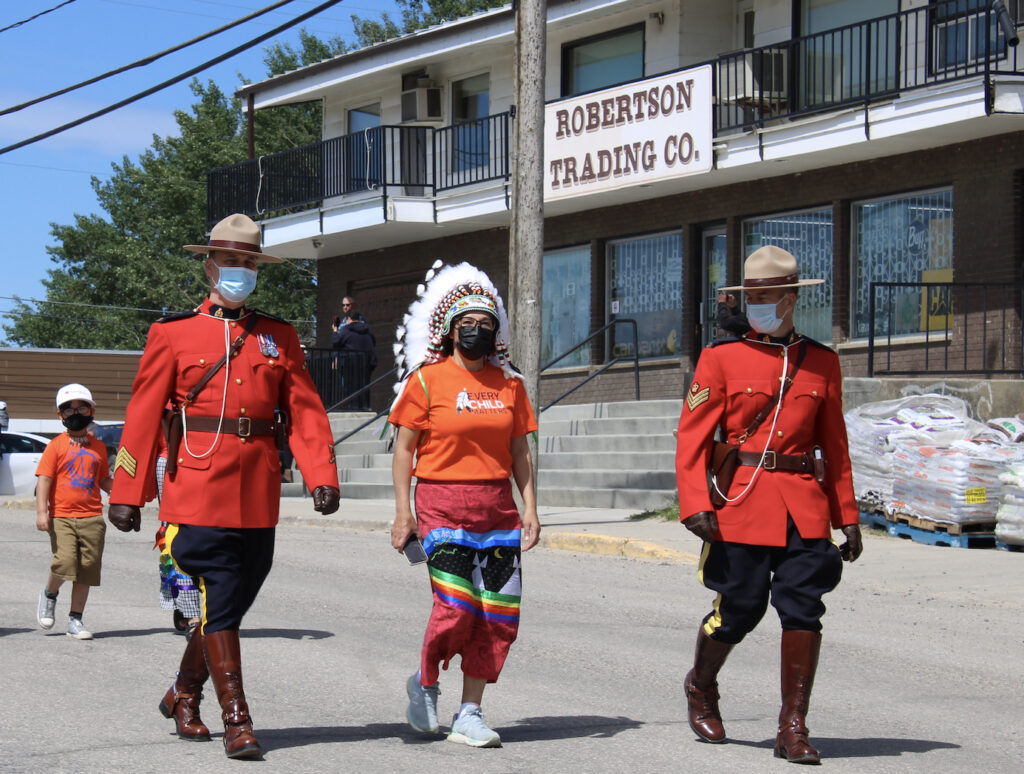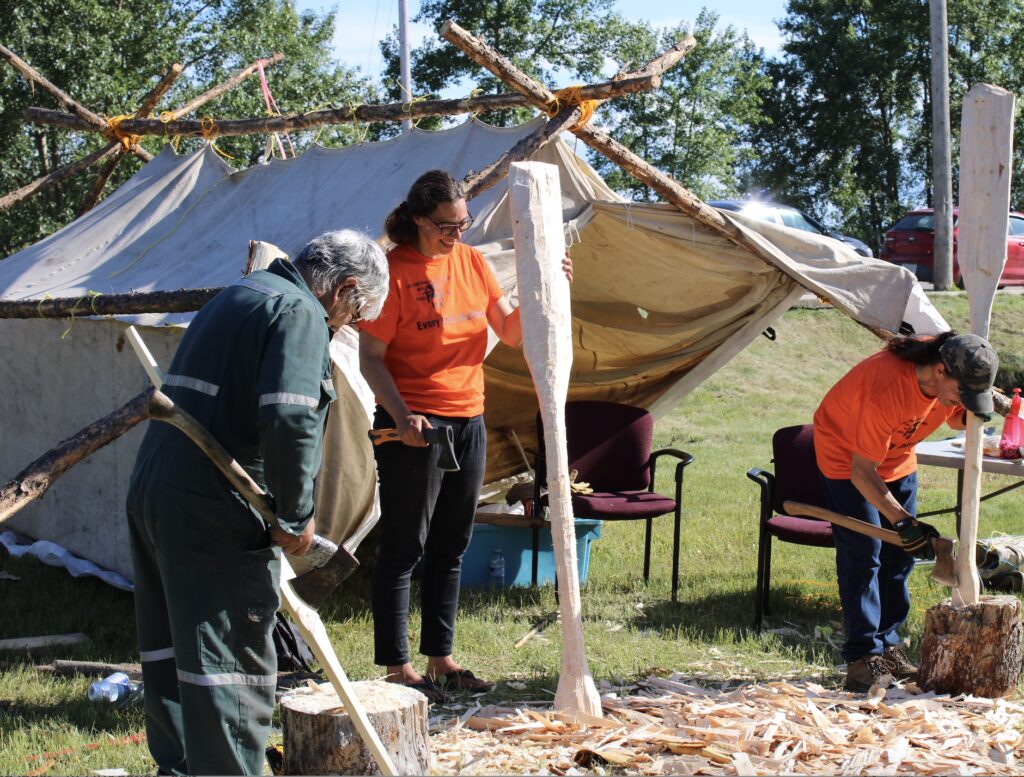
Warning: This story contains details that can be upsetting to readers
The Lac La Ronge Indian Band in northern Saskatchewan celebrated National Indigenous Peoples Day on Monday alongside the Town of La Ronge and Northern Village of Air Ronge.
The holiday has been celebrated on June 21 since 1996. This year festivities took on special significance. The communities have cancelled Canada Day festivities together in an act of solidarity with Indigenous people amid a national reckoning with the residential school system.
“Indigenous Peoples Day is a time to come together and unite as a community to celebrate all our unique talents, skills and accomplishments,” master of ceremonies Tom Roberts said.
“We have excelled in arts, music, dance, culture and tradition. We are here today to showcase how significant we are as Woodland Cree Indigenous people. We have and continue to be great contributors to Canadian society. As our history has shown through the many tragedies we have endured, we are still here, and we are getting stronger.”

Roberts, a survivor of the residential school in Prince Albert who now works as a counsellor with the Lac La Ronge Indian Band’s prevention and recovery program, said the timing couldn’t be more appropriate.
“For generations many Indigenous groups have celebrated our culture and heritage at this time of the year,” Roberts said.
“The week of June 21 was also the time of the year when we would be coming home (from residential school) for two months after being gone for 10 months — to see our mom and dad, brothers and sisters. I get emotional when I talk about that.”
The day began with a pipe ceremony followed by a smudge walk to the site of two former residential schools in La Ronge where prayers and music filled the summer air.
“It’s been a real emotional rollercoaster for all of us that are here. It’s been a time to reflect and a time to remember,” Lac La Ronge Indian Band Chief Tammy Cook-Searson said.
“This year we decided to put a pause on Canada Day and to celebrate and to come together on National Indigenous Peoples Day. We did this for the children and the parents and the families that never got closure — that didn’t have a say and that didn’t have a voice. Nowhere in Canada can you have 215 children buried under a school and not say anything.”
Cook-Searson thanked the mayors of the adjacent communities for their solidarity on the issue.
“The children are speaking loud, and they want us to come together. They want us to reconcile and that’s why we’re here together,” she said.
“We’re here to come together and to figure out how we move forward… and how to work together. That’s what we have to do is continue to work together and continue to build those bridges.”

La Ronge Mayor Colin Ratushniak experienced some blowback to the town’s decision to cancel Canada Day festivities and focus on the June 21 holiday instead.
“If there’s one thing that I’ve learned over the last week it’s that we have a lot more work to do. It’s not easy to have these uncomfortable, very challenging conversations,” Ratushniak said.
“The more we stand together in solidarity to really understand what truth and reconciliation is going to mean for this country, the further we can push and the further we can essentially be the true Canadians that I know we can be. I’m here to listen and to learn and just really understand the traumas that are currently going on with our Indigenous people in this country.”
Air Ronge Mayor Julie Baschuk and her council painted the village council office with arrows, the numbers 215 and the words “Treaty Six Territory.”
“We do stand here together in solidarity, in respect and in truth,” Baschuk said.
“It hasn’t been easy but the importance and significance of what today truly is representing as we move forward not only as our community but as a province and a country.”
Jim Brady Métis Local 19 President Laura Burnouf spoke through tears as she described growing up at the residential school in Beauval.
“I express my deep sorrow on behalf of me for the children that have been found and the ones that are still being found,” Burnouf said.
“I’m a part of the residential school (system). As Métis we were kind of stuck in the middle. That’s why I have a lot of emotions about it. This is the beginning and I’m willing to partner and reconcile. I have visited the people in this community. There are status people, non-status, Métis and non-native all living in the same households. We have to live together.”
Cumberland MLA Doyle Vermette, who is also Métis, echoed Burnouf’s sentiment.
“So many of us are lucky to have blended families. We share the knowledge and the culture together with respect and that is truly amazing to watch,” Vermette said.
La Ronge RCMP Staff Sgt. Dean Bridle said that he felt honoured to be included in the event. He said the Saskatchewan RCMP is committed to creating meaningful change to improve relationships with Indigenous people.
“We recognize that reconciliation is not a single event or a speech. Nor is it something that can be checked off of a list,” Bridle said.
“Reconciliation is a constant movement toward the future, a reflection of the past and an ongoing dialogue. Reconciliation requires the recognition of our shared vision and our history with Indigenous communities.”

Also in attendance were representatives of the Prince Albert Grand Council (PAGC) and the Federation of Sovereign Indigenous Nations (FSIN).
We have to remember that we never gave up our land and our waters that are being occupied. We never gave up our lands. That’s what reconciliation means,” PAGC Vice Chief Joseph Tsannie said.
“We have to be at those tables when they’re making those decisions on behalf of our loved ones and our communities.”
He said First Nations need fair and inclusive access to the healthcare system, education and economic opportunities.
“We have to stand together so we can all be accountable. We all want to build healthy communities. Through reconciliation, partnership and understanding — with time and love — I think we can do that,” Tsannie said.
“Each and every one of you, continue on. We’re not here for ourselves, we have to create that foundation for our young people.”
FSIN Vice Chief Edward (Dutch) Lerat said he was glad to see the three communities coming together during this time — in a way that he hasn’t seen elsewhere in Saskatchewan.
“Today we’re here to celebrate Indigenous day and I acknowledge the mayors and chief for putting that Canada Day aside and celebrating Indigenous day,” Lerat said.
“It’s time to be proud of who we are and we are proud of who we are. We acknowledge this day. We thank the Creator for giving us this day to come and celebrate our Indigenous pride.”

The idea to focus on June 21 and put aside Canada Day festivities this year came in the form of a letter from 23-year-old Métis resident Sydney Kuppenbender.
Kuppenbender said it’s important to remember that the residential school system existed in Canada until 1996 — and that there are survivors in her generation.
“Many of the survivors exist today and so do many of the perpetrators. When you say ‘this is a dark side of Canada’s history’ that’s not the case. It’s very much part of our present,” Kuppenbender said.
“I would also like to humbly acknowledge the many survivors of residential schools who lived the traumas and the horrors of those colonial institutions. Today is for you and we honour you. Your existence is resistance, so thank you.”
She also spoke about the role non-Indigenous Canadians need to play in order to “write a brighter, more inclusive future.”
“I want to remind you that you are obligated to uphold the sacred treaties by which we are all bound. You are also obligated to be allies by listening, supporting and uplifting the voices of Indigenous peoples whose existence is threatened by the colonial state,” Kuppenbender said.
“By acknowledging the roles your ancestors played in our shared history and supporting the calls to action that Indigenous peoples bring forward, whatever they may be — including cancelling Canada Day — only then will we begin walking forward together.”

Festivities included outdoor activities such as music, canoeing and swimming. Sewing demonstrations, cultural displays and wood-working kiosks showcased First Nations and Métis culture. An on-site COVID-19 vaccination clinic administered Pfizer and Moderna during the event.
The day ended with a fireworks display that participants told the Prince Albert Daily Herald were more impressive than what was on offer for Canada Day last year.
Roberts said when he was at the residential school in Prince Albert, having been separated from his parents and siblings, he had nobody to teach him how to be in loving relationships.
“There was no love there. No one said, ‘I love you.’ No one was there to hug you. So, when we got out, the words ‘I love you’ didn’t mean a thing. They were just words,” Roberts said.
“We’re learning to love again.”
A national 24-hour Indian Residential School Crisis Line is available to support survivors and those affected. You can access emotional and crisis support referral services by calling 1-866-925-4419.

